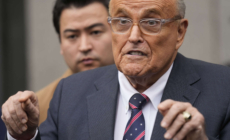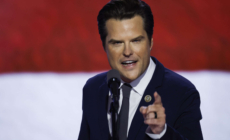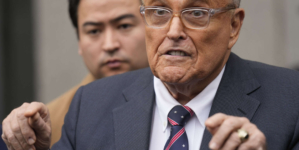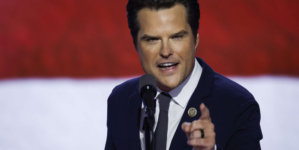-
How to Watch Pacers vs Warriors, Live Stream NBA, TV Channel - 8 mins ago
-
Alec Baldwin’s ‘Rust’ prosecutors withdraw appeal in manslaughter case, officially ending it - 24 mins ago
-
Inside Syria’s torture chambers with ex-prisoner - 29 mins ago
-
Joel Embiid ejected with 2 technicals in game vs. Victor Wembanyama and Spurs - 40 mins ago
-
Rudy Giuliani Hawks Rudy Coffee While Dressed as Santa Amid Legal Woes - 47 mins ago
-
Trial of former D.A. advisor on hold after appeals court steps in - about 1 hour ago
-
Can the Cowboys’ late-season surge help Mike McCarthy keep his job? - about 1 hour ago
-
Who is the Nordstrom Family? Department Store Goes Private in $6.25 Billion Deal - about 1 hour ago
-
Governor helps secure $250 million to help fix the Tijuana River sewage crisis - 2 hours ago
-
Matt Gaetz Ethics Report: What’s Next for Former Lawmaker - 2 hours ago
U.S. allies, haunted by past Trump insults, race to delete posts and praise election victor
Donald Trump’s presidential victory means some U.S. allies may have to reckon with prior scathing remarks as their countries prepare to build diplomatic ties with a president-elect whose return they may not have anticipated.
“The most destructive president in history,” Australian Ambassador to the U.S. Kevin Rudd said of Trump in 2020, who “drags America and democracy through the mud.”
“A woman-hating, neo-Nazi-sympathizing sociopath” and a “profound threat to the international order,” David Lammy, the U.K.’s current foreign secretary, said in 2018.
“A political pyromaniac who must be put before a criminal court,” Jean Asselborn, then-foreign minister for Luxembourg, said of Trump after the Jan. 6, 2021, Capitol riot.
“Trump has ruined it all,” Croatian President Zoran Milanović said, also in 2021. “He incite[s] hate, he is a rabble-rouser and that’s it.”
Following Trump’s election victory, at least two of these U.S. allies, the U.K. and Australia, have had to dial back some of their previous attacks.
Rudd deleted his posts after Trump’s win, “out of respect for the office of President of the United States,” an Australian government statement said, and to “eliminate the possibility of such comments being misconstrued as reflecting his positions as Ambassador and, by extension, the views of the Australian Government.”
For Trump’s part, he responded to Rudd’s comments by calling him “nasty” and saying Rudd “won’t be there long” as Australian ambassador to the United States.
Lammy pivoted from scathing critic to polite well-wisher, showing that diplomacy sometimes means shaking hands with those you once pointed fingers at.
Lammy, who made his comments about Trump being “a woman-hating, neo-Nazi-sympathizing sociopath” in Time magazine in 2018 when he was a backbench minister of Parliament, had also protested against the then-government’s “capitulation to this tyrant in a toupee.”
By Wednesday, as Trump claimed his decisive electoral victory, Lammy’s tone as foreign secretary had shifted considerably, as he sent his congratulations and underlined the U.K.’s cherished special friendship with the U.S.
Relations between Britain’s ruling center-left Labour Party and Trump have been antagonistic in the lead-up to the election, with Trump accusing the British of election interference.
In October, Trump’s team asked the Federal Election Commission to investigate after a senior Labour figure posted a rallying cry for current and former staffers to travel to battleground states and campaign for Harris.
In the first phone call between the pair after the U.S. election, U.K. Prime Minister Keir Starmer offered his “hearty congratulations” to Trump after his “historic victory,” a spokeswoman for the prime minister’s office said in a statement Wednesday.
Charles Parton, who served as a British diplomat for almost four decades, said that “the Labour Party has got some grounds to make up” after a perception that Starmer’s party had favored the Democrats.
On top of Lammy’s remarks, Parton believes that Starmer’s “somewhat effusive statement” is an attempt to “try and make up lost ground.”
Nigel Farage, the leader of the far-right Reform UK party, offered to help bridge Labour’s awkward relations with Trump, whom he considers a personal friend with whom he is ideologically aligned, an offer the Labour Party declined.
Source link































